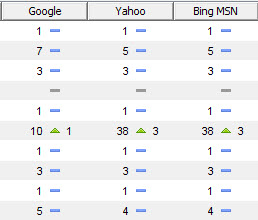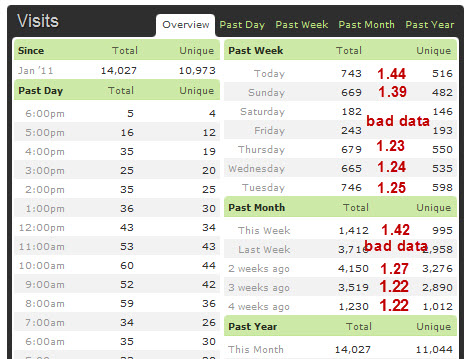Google vs Bing
Quite Similar Results
A few months back I was running Advanced Web Ranking and noticed that Google and Bing were really starting to come in line on some keywords.

Major Differences
Of course there are still differences between Bing and Google.
Google has far more usage data built up over the years & a huge market share advantage over Bing in literally every global market. Microsoft's poor branding in search meant they had roughly 0 leverage in the marketplace until they launched the Bing brand. That longer experience in search is likely what gives Google the confidence to have a much deeper crawl.
That head start also means that Google has been working on understanding word meanings and adjusting their vocabulary far longer, which also gives them the confidence to be able to use word relationships more aggressively (when Bing came to market part of their ad campaign was built on teasing Google for this). The last big difference from an interface perspective would be that Google forces searchers down certain paths with their Google Instant search suggestions.
Who Copied Who?
But the similarities between the search engines are far greater than their differences.
- At the core of Google's search relevancy algorithm is PageRank and link analysis. Bing places a lot of weight on those as well.
- Google also factors in the domain name into their relevancy algorithms. So does Bing.
- Google has long had universal search & Bing copied it.
- Google has tried to innovate by localizing search results. Bing localizes results as well.
- Bing moved the right rail ads closer to the organic search results. Google copied them.
- Bing put a fourth ad above the organic search results. Google began listing vertical CPA ad units for mortgages and credit cards above the organic search results - a fourth ad unit.
- Bing has a homepage background image. Google copied them by allowing you to upload a personalized homepage logo.
- Bing offers left rail navigation to filter the search results. Google copied them by offering the same.
- Bing innovated in travel search. Google is trying to buy the underlying data provider ITA Software.
- Bing included Freebase content in their search results. Google bought Metawebs, which owns Freebase.
- Bing offered infinite scroll and a unique image search experience that highlights the images. Google copied it.
Oh, The Outrage
Off the start Bing was playing catch up, but almost anything they have ever tried which has truly differentiated their experience ended up copied by Google. Recently Google conducted a black PR campaign to smear Bing for using usage data across multiple search engines to improve their relevancy. The money quote would be:
Those results from Google are then more likely to show up on Bing. Put another way, some Bing results increasingly look like an incomplete, stale version of Google results—a cheap imitation.
Perhaps why Google finds this so annoying is that it allows Microsoft to refine their "crawl" & relevancy process on tail keywords, which are the hardest ones to get right (because as engines get deeper into search they have fewer signals to work with and a lot more spam). It allows Microsoft to conduct tests which compare their own internal algorithms against Google's top listings on the fly & learn from them. It takes away some of Google's economies of scale advantages.
Of course, Google uses the same sort of data to help refine their own search algorithms. The brand update was all about ranking related resources from subsequent related searches higher in the initial result set. YouTube's video recommendation engine was built on ideas from Amazon's recommendation algorithm (but Google *accidentally* left off the citation).
Is Google Eating Its Own Home Cooking (And Throwing UP?)
Here is what I don't get about Google's complaints though. Google had no problem borrowing a half-dozen innovations from Bing. But this is how Google describes Bing's "nefarious" activities:
“It’s cheating to me because we work incredibly hard and have done so for years but they just get there based on our hard work,” said Singhal. “I don’t know how else to call it but plain and simple cheating. Another analogy is that it’s like running a marathon and carrying someone else on your back, who jumps off just before the finish line.”
Yet when popular vertical websites (that have invested a decade and millions of Dollars into building a community) complain about Google disintermediating them by scraping their reviews, Google responds by telling those webmasters to go pound sand & that if they don't want Google scraping them then they should just block Googlebot & kill their search rankings.
When a content site compiles reviews, creates editorial features to highlight the best reviews (and best reviewers), and works to create algorithms to filter out junk and spam then Google is fine with Google eating all that work for free. Google then jumps off their backs just before the finish line and throws the repurposed reviews in front of Google searchers.
But if Bing looks at the data generated by searchers who are performing the searches on Google and uses it as 1 of 1,000 different relevancy signals then Google is outraged.
Clickstream Data & You
This public blanket admission of Microsoft using clickstream data for relevancy purposes is helpful. But outside of the PR smear campaign from Google there wasn't much new to learn here, as this has been a bit of an open secret amongst those in the know in the search space for well over a year now.
But the idea of using existing traffic stream data as a signal increases the value of having a strong diversified traffic flow which leverages:
- search advertising (to get your foot in the door)
- other forms of advertising that lead to exposure
- making noise on social sites
- cross promotion of featured network content
- ranking in search verticals (which are sometimes incorporated into Google's core result set)
- beautiful web design which looks good...
- upon inspection using the likes of Google Instant Previews
- while viewing it as a website user
Recently we tested adding ads on one of our websites that had a fairly uninspired design on it. After adding the ads (which make the site feel a bit less credible) the new design was so much better fitting than the old one that the site now gets 26% more pageviews per visit. Anytime you can put something on your website which increases monetization, sends visitors away & yet still get more user engagement you are making a positive change!

If You Can't Beat Em, Filter
I was being a bit of a joker when I created this, but the point remains that as larger search engines force feed junk (content mills and vertical search results) down end user's throats that some of the best ways for upstart search engines to compete is to filter that stuff out. Both DuckDuckGo and Blekko have done just that.
The Future of (In)Organic Content Farming
Demand Media is currently worth $1.74 billion, but it remains to be seen what happens to the efficacy of the content farm business model if & when Google makes promised changes. And given that Yahoo! is Bing's biggest source of search distribution, it would be hard for Microsoft to crack down to hard without potentially harming that relationship (since Yahoo! owns Associated Content), but Google & Microsoft are the only game in town with search ads. The DOJ already blocked Yahoo!-Google. Trying to win marketshare from Google, Microsoft is burning over $2 billion a year.




Comments
Great post. Google is crying wolf. They did the same thing to overture years ago with improving on their PPC model with their own products. Why canrt Bing do the same thing vs google?
I don't know what it is, but it seems that Google is doing a lot of whining lately. Google enjoys being #1 but they seem to not do so well when competition comes along, no matter how small it may be.
Good point markeitngall in terms of what Google did with Overture. But technically that was *far* worse than what Microsoft has done. Google is only showing a bit of a fuzzy connection (and deceitfully 'reported' a small sliver of information) in Microsoft's case, whereas with Overture, Google infringed on their existing patents. Google had to give away hundreds of millions of Dollars worth of stock to Yahoo! to settle that lawsuit.
yea i also go for Google ranking first as most of the times Bing and Yahoo makes med happy by showing enough promotion of my website :P i don't get it that why this is this much difference in there?
Add new comment